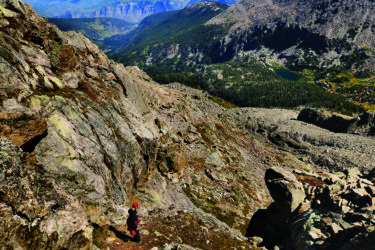The Local newsletter is your free, daily guide to life in Colorado. For locals, by locals.
In 2018, when a friend first told Jen Magnuson about Basecamp, a Facebook group for outdoorsy folks looking for outdoorsy jobs, she didn’t put too much stock in it. The Mancos local was heading into her second year as an adventure photographer and figured joining might lead to a few freelance gigs—but it led to a lot more than that. From how to time her pitches to companies’ marketing calendars to the importance of understanding each potential client’s specific brand of outdoorsiness, Basecamp helped pull back the curtain on a notoriously opaque industry.
“The industry can come off as a club that you have to know someone to get in,” says Ali Carr, a Los Angeles–based content consultant and outdoor journalist who used her Rolodex from her time as an Outside magazine editor to start Basecamp four years ago. “So I wanted to make the group an open door.”
The response was palpable, and the Facebook group rocketed from around 200 members when it launched in 2017 to more than 20,000 earlier this year. (It’s still private, but anyone can join.) Realizing their passion project was outgrowing its social media roots, Carr and co-founder Jenna Celmer, a brand strategist and consultant in Colorado Springs, saw an opportunity to turn it into something more. They’ve expanded Basecamp’s door-busting tools to include weekly discussion panels with industry insiders; newsletters with curated job postings (companies pay to advertise), event roundups, gear giveaways, and career advice; and the Outdoor Dream Jobs podcast, in which the duo interviews executives and hiring managers from major players like GearJunkie, Patagonia, and the North Face about their openings and ideal candidates.
Now all their hard work has culminated in a website: wearetheoutdoorindustry.com. Launched earlier this spring, the site is a hub for all those services, with plans for paid products like classes, speaker series, networking cohorts, and whatever else they can dream up. But everything they do will have one goal: being a resource for everyone who doesn’t have access to the more traditional routes into the industry.
“When you see these opportunities churning,” Carr says, “it gives you hope that something perfect for you is going to come through.”
Inside Jobs
Some economists are predicting a vaccine-driven hiring spree this spring. With that in mind, here are Carr and Celmer’s top five tips for your next job search.
1. Brag
“A lot of people don’t want to look conceited,” Celmer says, “but that’s the wrong risk to be worried about. Celebrate your achievements, because if you don’t, who will?”
2. Be Specific
“A lot of people say, ‘I can do anything and will move anywhere,’ but that’s the least helpful thing you can do,” Carr says. “There’s a perfect candidate for every opening, so finding a job where that’s you will save you a lot of time versus applying to things you’re open to on a generic level.”
3. Keep a Winning Record
Concrete examples of your skills are essential for a good cover letter, but they’re easy to forget. “Keeping an ongoing list of your achievements means you won’t have to remember later,” Celmer says. Then simply tailor your cover letter with the best examples for each opening.
4. Live Your Values
“Patagonia, for example, wants to know how active their candidates are in terms of environmental justice. It’s almost more important to them than a candidate’s skills,” Carr says. Volunteering is a great option because it looks good on a resumé, helps your community, and it’s a great chance to network.
5. Ask For It
“Mentors are a cheat code for your career. They’ve done what you want to do and know all the pitfalls along the way,” Celmer says. Don’t be afraid to aim high. “I’ve asked people with crazy titles to mentor me, and they’ve all said yes because no one had asked them before.”
Editor’s Note, 5/6/21: A previous version of this article stated that Ali Carr was based in Tahoe, California. She is based in Los Angeles. We regret the error.









